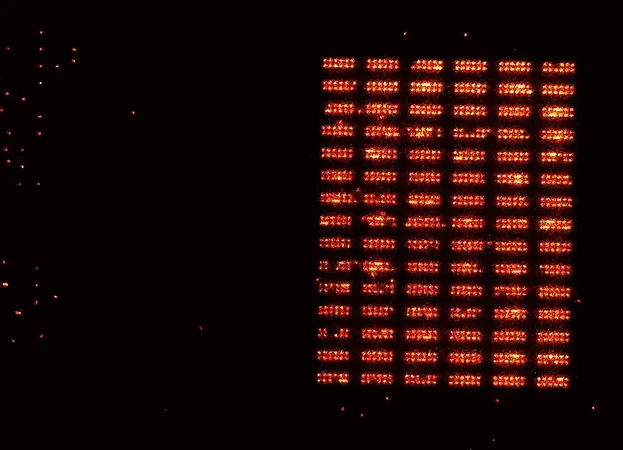
Breakthrough in Quantum Computing: 1,200 Neutral Atoms in Continuous Operation!
2024-10-09
Author: Olivia
Introduction
In a groundbreaking achievement for the future of quantum computing, a team of physicists, led by Johannes Zeiher at the Max Planck Institute of Quantum Optics, has successfully operated a quantum register of 1,200 neutral atoms for an impressive one-hour stretch. This significant advancement could revolutionize how we approach complex calculations in quantum mechanics, a field notoriously challenging for classical computers.
Challenges in Quantum Computing
Historically, managing large quantum systems has been fraught with difficulties, primarily due to the inevitable loss of atoms, which has hindered researchers' efforts to maintain stable operations. However, Zeiher's team has ingeniously implemented a technique that allows the continuous reloading of new atoms into their qubit register. This breakthrough not only stabilizes the quantum register but theoretically allows operations to continue indefinitely, marking a monumental stride towards achieving practical quantum computing.
The Complexity of Quantum Systems
One of the core challenges with quantum computing lies in the complexity of quantum systems, which grow exponentially as more particles are added. For instance, the behavior of just 100 quantum particles is often beyond the reach of even the most advanced supercomputers available today. Richard Feynman, a celebrated physicist, recognized this limitation as early as the 1980s, advocating for quantum computers that could simulate the exact behaviors and phenomena of quantum systems due to their inherent quantum nature.
Innovative Techniques in Quantum Computing
Zeiher's recent developments focus on neutral atoms, which serve as efficient qubits — the fundamental units of quantum information. By employing optical lattices to trap these atoms individually, his team has created a robust and scalable environment for quantum computation. The newly integrated 'reloading zone' enables the addition of around 130 atoms every 3.5 seconds to replenish the quantum register, significantly mitigating the challenge of atomic losses that hitherto restricted quantum systems' sizes.
Future Implications
This innovative approach is poised to unlock the potential for larger, more complex calculations and simulations that are crucial in fields like materials science and quantum chemistry. As Zeiher explained, a stable and extended operation of quantum systems is essential for executing large-scale calculations and simulations, and their ongoing work aims to enhance qubit coherence even during regular reloading.
Broader Applications
The future implications of their findings are vast. According to physicist Stepan Snigirev, co-author of the study, achieving continuous operation of large arrays of qubits is essential for implementing error-correcting protocols necessary for real-world quantum applications. This research is not only paving the way for scalable quantum computing but could also spark new applications across industries, from pharmaceuticals, where quantum simulations can lead to breakthroughs in drug development, to materials engineering, where we could tailor materials at the quantum level.
Conclusion
As the team continues to refine their techniques and explore the implications of quantum entanglement, the quantum computing landscape may soon witness robust innovations that were previously thought unattainable. Exciting times lie ahead for quantum physicists, and this breakthrough marks just the beginning!









 Brasil (PT)
Brasil (PT)
 Canada (EN)
Canada (EN)
 Chile (ES)
Chile (ES)
 España (ES)
España (ES)
 France (FR)
France (FR)
 Hong Kong (EN)
Hong Kong (EN)
 Italia (IT)
Italia (IT)
 日本 (JA)
日本 (JA)
 Magyarország (HU)
Magyarország (HU)
 Norge (NO)
Norge (NO)
 Polska (PL)
Polska (PL)
 Schweiz (DE)
Schweiz (DE)
 Singapore (EN)
Singapore (EN)
 Sverige (SV)
Sverige (SV)
 Suomi (FI)
Suomi (FI)
 Türkiye (TR)
Türkiye (TR)